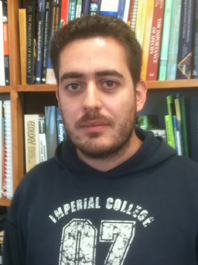Dr. Alexandros Gasparatos Associate Researcher
Previous Work
Academic profile
Alex was a James Martin research fellow working with Prof. Kathy Willis at the Biodiversity Institute in the Department of Zoology.
His PhD thesis was in the broad area of ecological economics. Before joining the Biodiversity Institute, Alex spent three years at the Institute of Advanced Studies of the United Nations University (UNU-IAS) in Yokohama initially as a Canon Foundation Fellow and subsequently as a JSPS-UNU Fellow.
Research interests
Alex is an ecological economist whose research interests lie in the development and refinement of sustainability assessment and ecosystem services valuation methods. He is also conducting research on biofuels, energy policy, food security, natural disasters, urban metabolism and urban biodiversity in countries such as Brazil, Japan, Indonesia and the Philippines.
Current research
Biofuels and ecosystem services
The aim of this project was to explore how the ecosystem services approach can be used to frame, understand, assess and convey the direct and indirect impact of biofuel production and use. A key component of this project is the development of a methodology that can allow the rapid, robust and user-friendly evaluation of the biofuel potential and the impact of biofuel expansion on ecosystem services in different landscapes around the world such as Jatropha in southern Africa, oil palm in Southeast Asia and sugarcane in Brazil.
Drivers and impacts of diet shifts in Asia
In the past decades radical diet shifts have been observed in parts of Asia. In several cases such diet shifts involve increasing meat consumption a phenomenon often called diet Westernization. This project aims to identify the socioeconomic drivers of these shifts for 16 Asian countries and explain its impacts at interface of energy security, food security and environmental sustainability.
The impact of climate change induced increases in typhoon intensity in the Asia-Pacific
Northwestern Pacific tropical storms (typhoons) are expected to become stronger due to climate change. There are fears that stronger typhoons will have significant impact on the socioeconomic activity of island nations such as Japan, Taiwan and the Philippines. The aim of this project is to develop a predictive model that can quantify the impact of climate change induced increases in typhoon intensity on agricultural systems, rice production in particular, in a spatially explicit manner.
Urban activity and its environmental impact
Currently urban populations are the largest consumers of natural resources, which are most of the times sourced far away from cities. This research project aims to explore how urban activity/consumption in two megacities can affect the environment locally and regionally. The first study explores the changes in natural capital consumption and land appropriation within Japan due to diet changes in Tokyo (higher meat consumption) since the early 1970s. The second study aims to identify and quantify potential air pollution and greenhouse gas emission co-benefits resulting from the increasing use of bioethanol in Sao Paulo’s transport system since the mid-1970s.
Selected Publications
- Stromberg, P, Esteban, M, Gasparatos, A, 2011. Climate change effects on mitigation measures: The case of extreme wind events and Philippines’ biofuel plan.Environmental Science and Policy, 14, 1079-1090
- Gasparatos, A., Stromberg, P., Takeuchi, K., 2011. Biofuels, ecosystem services and human wellbeing. Agriculture, Ecosystems and Environment, 142, 111-128.
- Gasparatos, A, 2011. Resource consumption in Japanese agriculture and its impact on food security. Energy Policy, 39, 1101-1112
- Oliveira, J., Balaban, O., Doll, C., Moreno-Penaranda, R., Gasparatos, A., Iossifova, D., Suwa, A., 2011.Governance, cities and biodiversity: Perspectives and challenges of the implementation of the CBD at the city level. Biological Conservation, 144, 1302-1313.
- Gasparatos, A, 2010. Embedded value systems in sustainability evaluation tools and their implication. Journal of Environmental Management, 91, 1613-1622.
- Gasparatos, A, Gadda, T, 2009. Environmental support, energy security and economic growth in Japan. Energy Policy, 37, 4038-4048.
- Marcotullio, P, Gadda, T, Gasparatos, A, 2009. Land use change and meat consumption in New York and Tokyo. Asia Pacific Forum, 43, 75-110.
- Gadda, T, Gasparatos, A, 2009. Land use and cover change in Japan and Tokyo’s appetite for meat. Sustainability Science, 4, 165-177.
- Gasparatos, A, El-Haram, M, Horner, M, 2009. The argument against a reductionist approach for measuring sustainable development performance and the need for methodological pluralism. Accounting Forum, 33, 245-256.
- Gasparatos, A, El-Haram, M, Horner, M, 2009. Assessing the sustainability of the UK society using thermodynamic concepts: Part 1. Renewable and Sustainable Energy Reviews, 13, 1074-1081.
- Gasparatos, A, El-Haram, M, Horner, M, 2009. Assessing the sustainability of the UK society using thermodynamic concepts: Part 2. Renewable and Sustainable Energy Reviews, 13, 956-970.
- Gasparatos, A, El-Haram, M, Horner, M, 2009. A temporal analysis of the UK transport sector, 1970-2010. Energy Policy, 37, 623-632.
- Gasparatos, A, El-Haram, M, Horner, M, 2008. A critical review of reductionist approaches for assessing the progress towards sustainability Environmental Impact Assessment Review, 28, 286-311
Book chapters
- Gasparatos, A., Stromberg, P. (Eds.), 2012. Socioeconomic and environmental impacts of biofuels: Evidence from developing nations. Cambridge University Press, Cambridge.
- Gasparatos, A., Borzoni, M., Abramovay, R., 2012. The Brazilian bioethanol and biodiesel programmes: drivers, policies and impacts in Gasparatos, A., Stromberg, P. (Eds.),Socioeconomic and environmental impacts of biofuels: Evidence from developing nations, Cambridge University Press, Cambridge, pp. 111-143
- Stromberg, P., Gasparatos, A., 2012. Biofuels at the confluence of energy security, rural development and food security: a developing country perspective in Gasparatos, A., Stromberg, P. (Eds.), Socioeconomic and environmental impacts of biofuels: Evidence from developing nations, Cambridge University Press, Cambridge, pp. 3-26.
- Gasparatos, A., Stromberg, P., 2012. Synthesis, in Gasparatos, A., Stromberg, P. (Eds.), Socioeconomic and environmental impacts of biofuels: Evidence from developing nations, Cambridge University Press, Cambridge, pp. 309-323.
- Subramanian, S., Gasparatos, A., 2012. Enabling green economic transitions through biodiversity conservation: Potential and challenges, in Puppim de Oliveira, J. (Ed.),Green Economy and good governance for sustainable development: Opportunities, promises and concerns. United Nations University Press, Tokyo, pp. 181-195.
- Moreno-Penaranda, R., Gasparatos, A., Puppim de Oliveira, J., Suwa, A., Stromberg, P., (forthcoming). Biofuel induced palm oil expansion in Indonesia and Malaysia its impact on ecosystem services and human wellbeing in Takeuchi, Shiroyama, Matsuura and Saitoh (Ed.), Biofuels and sustainability. United Nations University Press, Tokyo.
Policy reports
- Stromberg, P., Gasparatos, A., Lee, J.S.H., Garcia-Ulloa, J., Koh, L.P., Takeuchi, K., 2010. Impact of liquid biofuels on ecosystem services and biodiversity. UNU-IAS Report, Yokohama. Available at http://www.ias.unu.edu/sub_page.aspx?catID=111&ddlID=169
- Braimoh, A., Subramanian, S., Elliot, W., Gasparatos, A., 2010.Human and climatic drivers of biodiversity loss in Southeast Asia. UNU-IAS Report, Yokohama. Available athttp://www.ias.unu.edu/sub_page.aspx?catID=111&ddlID=169
- Oliveira, J., Balaban, O., Doll, C., Moreno-Penaranda, R., Gasparatos, A., Iossifova, D., Suwa, A., 2010. Governance, cities and biodiversity: Perspectives and challenges of the implementation of the CBD at the city level. UNU-IAS Report, Yokohama. Available at http://www.ias.unu.edu/sub_page.aspx?catID=111&ddlID=169

